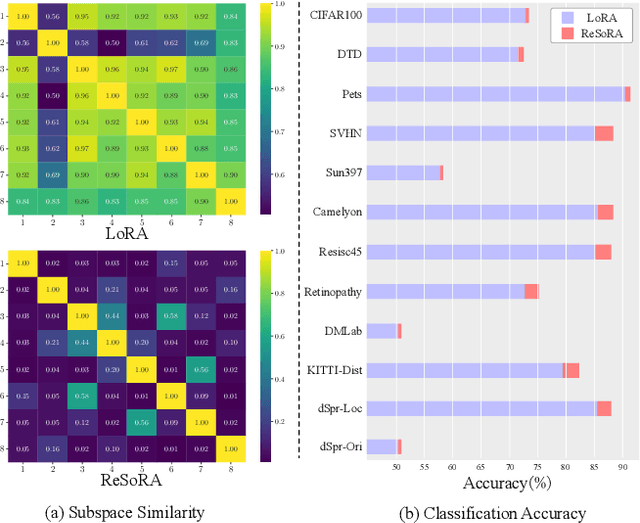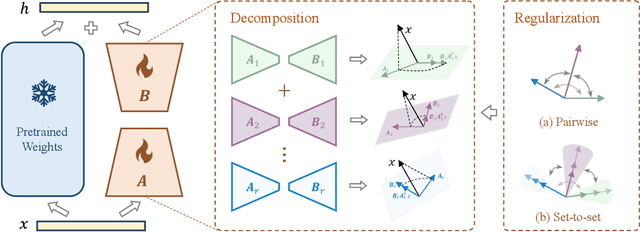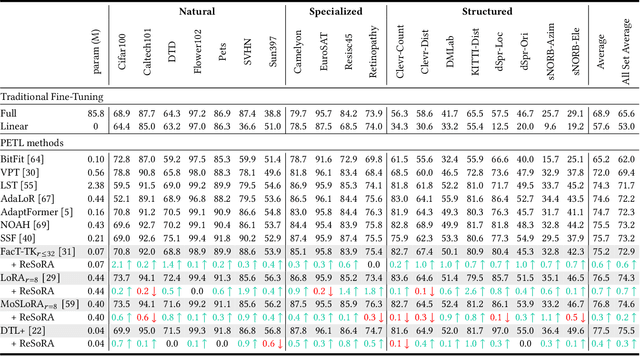Jiazuo Yu
Regularizing Subspace Redundancy of Low-Rank Adaptation
Jul 28, 2025



Abstract:Low-Rank Adaptation (LoRA) and its variants have delivered strong capability in Parameter-Efficient Transfer Learning (PETL) by minimizing trainable parameters and benefiting from reparameterization. However, their projection matrices remain unrestricted during training, causing high representation redundancy and diminishing the effectiveness of feature adaptation in the resulting subspaces. While existing methods mitigate this by manually adjusting the rank or implicitly applying channel-wise masks, they lack flexibility and generalize poorly across various datasets and architectures. Hence, we propose ReSoRA, a method that explicitly models redundancy between mapping subspaces and adaptively Regularizes Subspace redundancy of Low-Rank Adaptation. Specifically, it theoretically decomposes the low-rank submatrices into multiple equivalent subspaces and systematically applies de-redundancy constraints to the feature distributions across different projections. Extensive experiments validate that our proposed method consistently facilitates existing state-of-the-art PETL methods across various backbones and datasets in vision-language retrieval and standard visual classification benchmarks. Besides, as a training supervision, ReSoRA can be seamlessly integrated into existing approaches in a plug-and-play manner, with no additional inference costs. Code is publicly available at: https://github.com/Lucenova/ReSoRA.
LLMs Can Evolve Continually on Modality for X-Modal Reasoning
Oct 26, 2024Abstract:Multimodal Large Language Models (MLLMs) have gained significant attention due to their impressive capabilities in multimodal understanding. However, existing methods rely heavily on extensive modal-specific pretraining and joint-modal tuning, leading to significant computational burdens when expanding to new modalities. In this paper, we propose PathWeave, a flexible and scalable framework with modal-Path sWitching and ExpAnsion abilities that enables MLLMs to continually EVolve on modalities for $\mathbb{X}$-modal reasoning. We leverage the concept of Continual Learning and develop an incremental training strategy atop pre-trained MLLMs, enabling their expansion to new modalities using uni-modal data, without executing joint-modal pretraining. In detail, a novel Adapter-in-Adapter (AnA) framework is introduced, in which uni-modal and cross-modal adapters are seamlessly integrated to facilitate efficient modality alignment and collaboration. Additionally, an MoE-based gating module is applied between two types of adapters to further enhance the multimodal interaction. To investigate the proposed method, we establish a challenging benchmark called Continual Learning of Modality (MCL), which consists of high-quality QA data from five distinct modalities: image, video, audio, depth and point cloud. Extensive experiments demonstrate the effectiveness of the proposed AnA framework on learning plasticity and memory stability during continual learning. Furthermore, PathWeave performs comparably to state-of-the-art MLLMs while concurrently reducing parameter training burdens by 98.73%. Our code locates at https://github.com/JiazuoYu/PathWeave
Boosting Continual Learning of Vision-Language Models via Mixture-of-Experts Adapters
Mar 18, 2024Abstract:Continual learning can empower vision-language models to continuously acquire new knowledge, without the need for access to the entire historical dataset. However, mitigating the performance degradation in large-scale models is non-trivial due to (i) parameter shifts throughout lifelong learning and (ii) significant computational burdens associated with full-model tuning. In this work, we present a parameter-efficient continual learning framework to alleviate long-term forgetting in incremental learning with vision-language models. Our approach involves the dynamic expansion of a pre-trained CLIP model, through the integration of Mixture-of-Experts (MoE) adapters in response to new tasks. To preserve the zero-shot recognition capability of vision-language models, we further introduce a Distribution Discriminative Auto-Selector (DDAS) that automatically routes in-distribution and out-of-distribution inputs to the MoE Adapter and the original CLIP, respectively. Through extensive experiments across various settings, our proposed method consistently outperforms previous state-of-the-art approaches while concurrently reducing parameter training burdens by 60%. Our code locates at https://github.com/JiazuoYu/MoE-Adapters4CL
 Add to Chrome
Add to Chrome Add to Firefox
Add to Firefox Add to Edge
Add to Edge